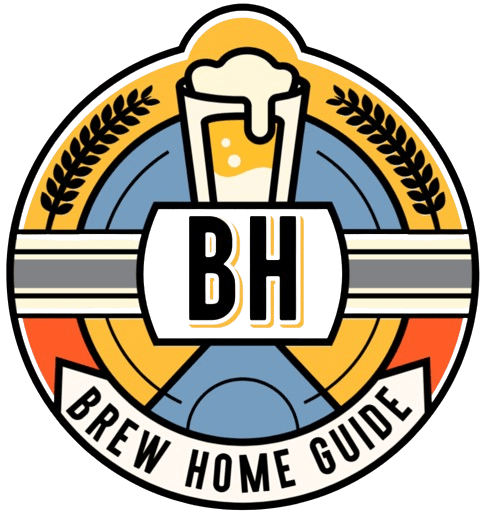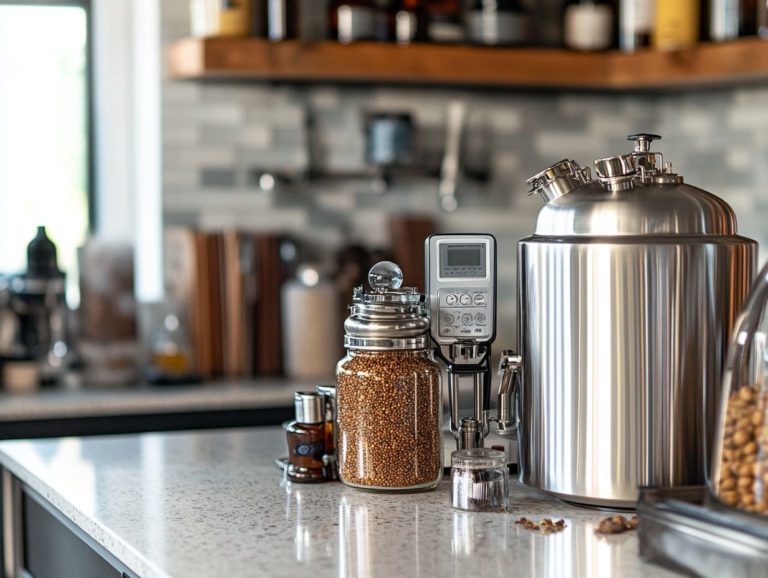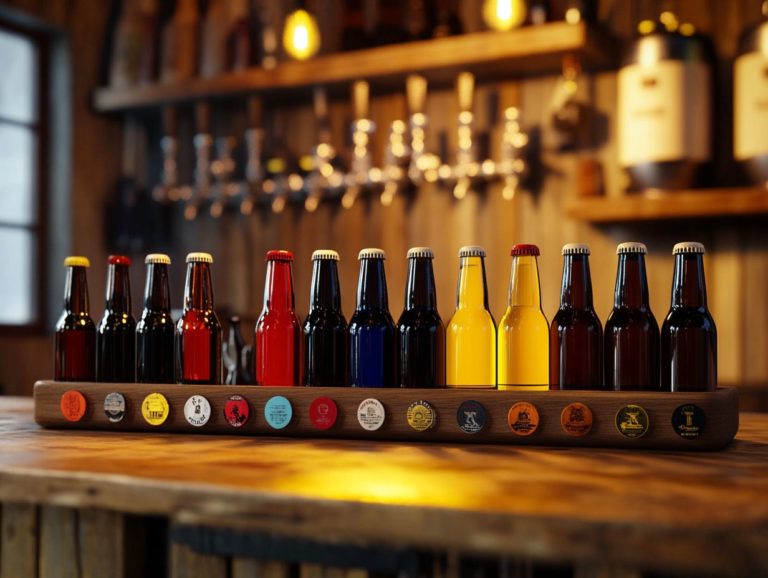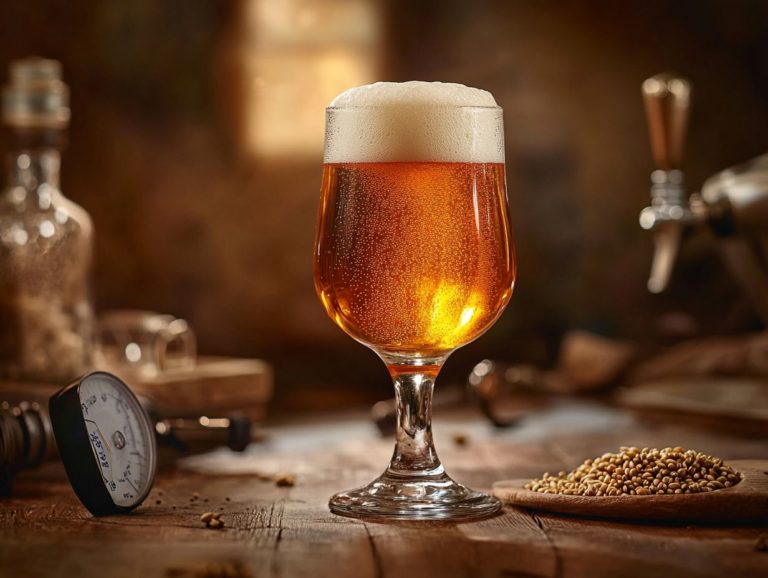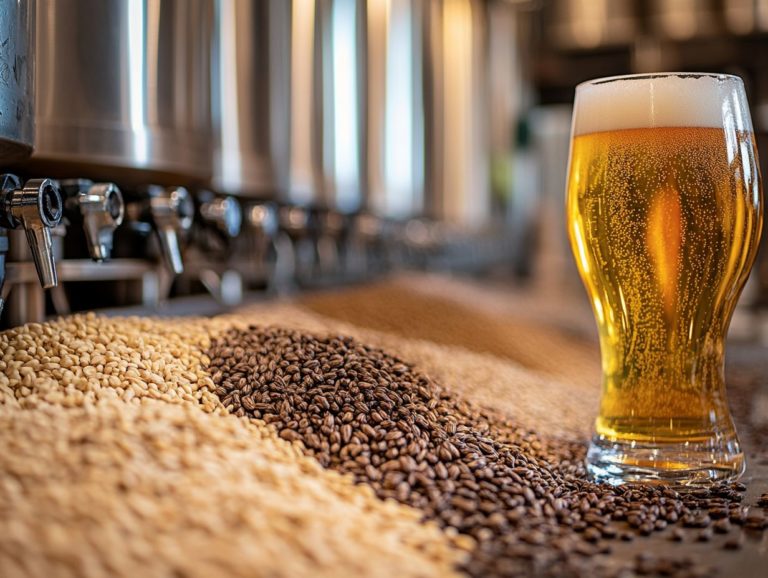Is Home Brewing Legal in My State?
Ready to dive into the world of home brewing? Let’s explore how to do it legally and safely! Home brewing has emerged as a cherished hobby for many enthusiasts, offering you the opportunity to craft your own distinctive alcoholic beverages right in the comfort of your home.
Before you embark on this rewarding journey, it’s crucial to grasp the legal landscape surrounding home brewing in the United States. This guide will navigate you through the federal and state laws, including the 18th Amendment and 21st Amendment, that outline what you can and can’t do while also directing you on how to find legal information pertinent to your specific location.
This guide highlights the advantages and potential pitfalls of home brewing. Whether you’re a seasoned brewer or simply curious about taking the plunge, this knowledge will empower you to brew with confidence, ensuring your experience is both safe and compliant with home brewing laws.
Contents
- Key Takeaways:
- What Is Home Brewing?
- Is Home Brewing Legal in the United States?
- How Do I Find Out If Home Brewing Is Legal in My State?
- What Are the Restrictions on Home Brewing in My State?
- Are There Any Special Permits or Licenses Required for Home Brewing?
- What Are the Benefits of Home Brewing?
- What Are the Risks of Home Brewing?
- What Are the Potential Health Risks of Home Brewing?
- How Can I Ensure Safe and Legal Home Brewing?
- Frequently Asked Questions
Key Takeaways:
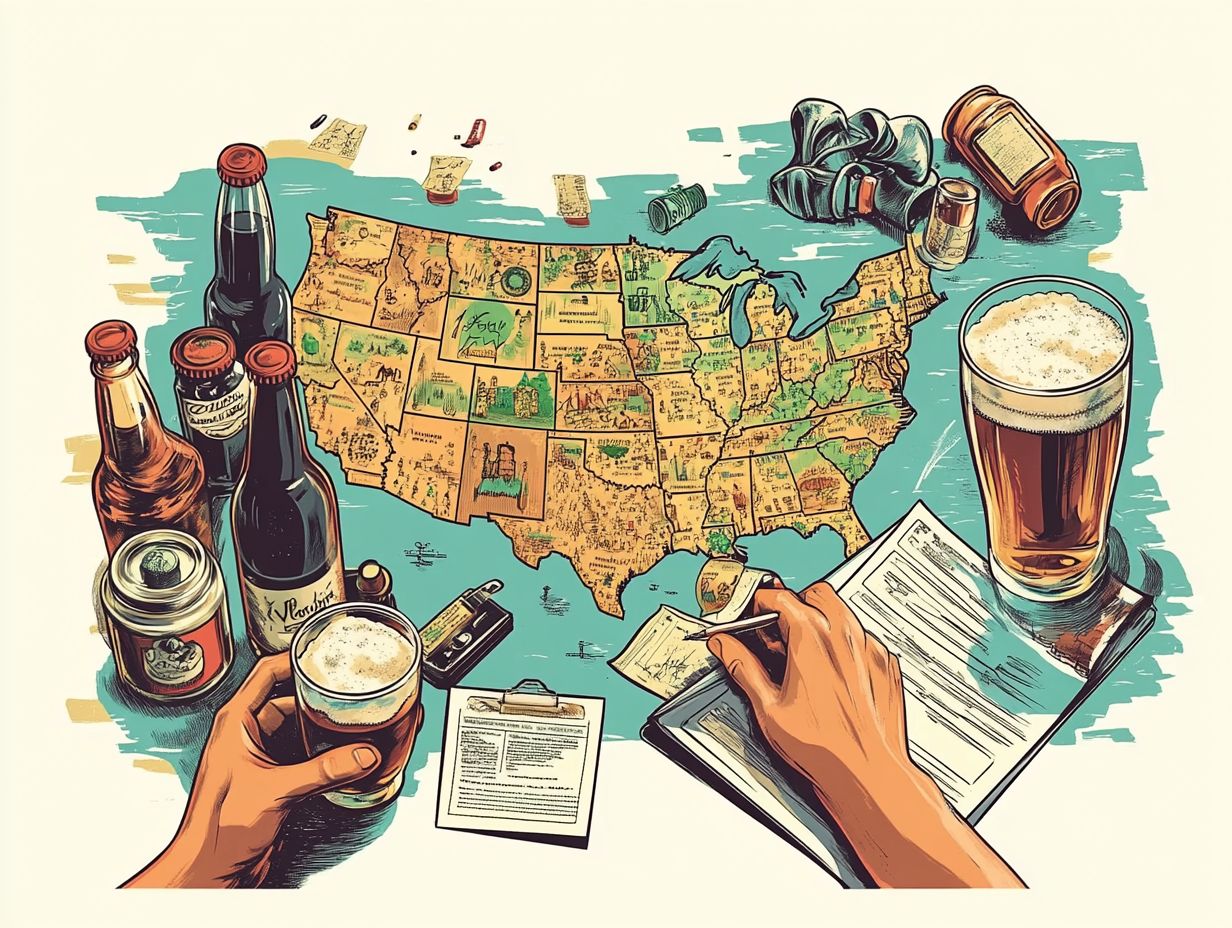
- Home brewing is the process of brewing beer, wine, or other alcoholic beverages at home.
- Home brewing is legal at the federal level in the United States, but individual state laws may vary.
- To determine if home brewing is legal in your state, research state alcohol laws and any specific restrictions or permits required.
What Is Home Brewing?
Home brewing is the art of crafting alcoholic beverages, primarily beer, right in the comfort of your own home for personal enjoyment. This practice opens up a world of possibilities, allowing you to experiment with a variety of recipes and brewing techniques for domestic use.
Its popularity has surged, particularly alongside the craft beer movement, where enthusiasts and hobbyists come together to participate in home brew competitions and share their passion through organizations like the American Homebrewers Association and events such as the National Homebrewers Conference.
Is Home Brewing Legal in the United States?
Home brewing is a perfectly legal endeavor in the United States, thanks to the repeal of Prohibition through the 21st Amendment, which grants individuals the right to produce alcoholic beverages for personal use. However, home brewing laws are different in each state. President Jimmy Carter played a significant role in this legalization effort.
This makes it crucial for you to familiarize yourself with both federal and state laws governing your home brewing rights and regulations, ensuring you can enjoy your craft responsibly and legally while adhering to alcohol regulations.
What Are the Federal Laws Regarding Home Brewing?
Federal laws regarding home brewing allow you the freedom to craft alcoholic beverages at home for personal enjoyment, all without the need for a license, as long as you stay within certain limits set by the federal government. Currently, you can brew up to 100 gallons of beer annually for personal consumption if you re the only adult in your household. If there are two or more adults, that limit doubles to 200 gallons.
It’s essential to understand that while you don t need a federal license under these production limits, there are still specific taxation regulations you must adhere to. The Alcohol and Tobacco Tax and Trade Bureau (TTB) oversees this area and expects you to pay excise taxes if your production exceeds the stipulated amounts. This is part of the broader legal framework established by the federal government for alcohol production.
Keep in mind that state laws can vary significantly, and some regions may impose their own restrictions or even require permits. Therefore, it s wise to familiarize yourself with local regulations concerning alcohol control. By arming yourself with this knowledge of federal guidelines, you can ensure that your home brewing remains a legal and enjoyable hobby, free from any unexpected legal or financial surprises.
As you explore this exciting hobby, consider reaching out to local brewing communities or resources to enhance your knowledge and skills in home brewing.
What Are the State Laws Regarding Home Brewing?
State laws regarding home brewing can vary dramatically, with certain states like Alabama and Mississippi imposing stricter regulations than others. It s essential for you as a home brewer to familiarize yourself with the laws in your area. Each state may have its own set of rules about production limits, distribution, and the legalities surrounding the transportation of homebrew.
For example, while some states may embrace home brewing by permitting larger batch sizes and requiring minimal licensing, others might restrict you to brewing just a few gallons annually. These legal intricacies not only determine how much you can brew legally but also influence how you can share and enjoy your creations with friends and family at social gatherings.
Navigating these varying regulations presents both challenges and opportunities within the homebrew community. Many local brewers find themselves connecting and collaborating, sharing tips, and advocating for more lenient laws in their states. This collective effort empowers you and others, enriching the craft and fostering creativity and innovation among home brewers everywhere, fueling the passion for home brewing.
How Do I Find Out If Home Brewing Is Legal in My State?
To find out whether home brewing is legal in your state, it’s crucial to delve into the local laws and regulations related to your legal residence, as these can differ significantly.
Begin by consulting your state’s Alcoholic Beverage Control Board (the agency that regulates alcohol) or a similar regulatory agency. They offer detailed insights into alcohol laws, including specific guidelines for home brewing that pertain to your legal residence. This is often part of the legislative session updates.
Where Can I Find Information on My State’s Alcohol Laws?
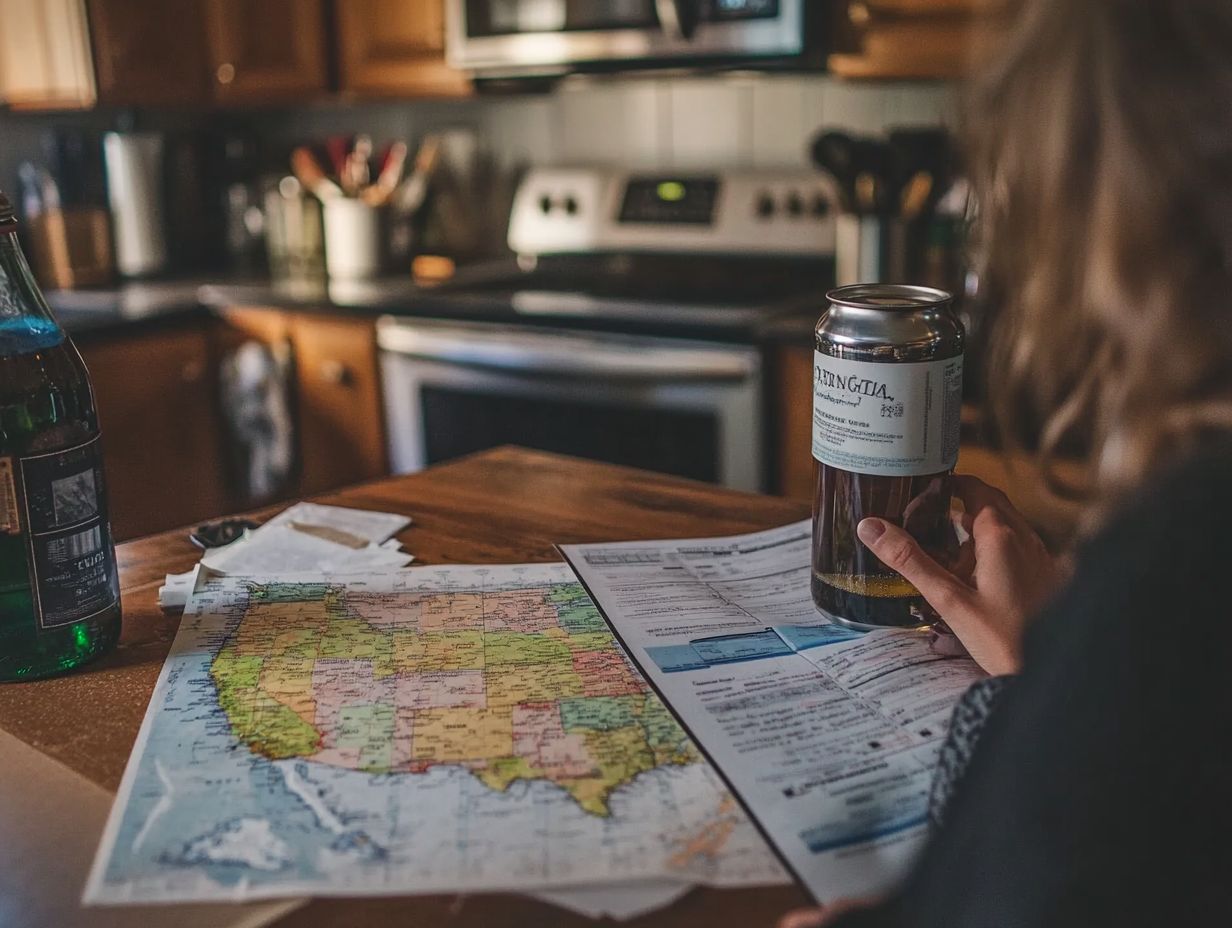
You can typically find information on your state’s alcohol laws through the official website of your state’s Alcoholic Beverage Control Board or the relevant regulatory body. These sites provide a comprehensive overview of the legal framework governing home brewing and alcohol production. They serve as invaluable resources, outlining homebrew regulations and detailing any permits or licenses you may need.
Within these resources, you’ll often discover links to local laws, application forms, and educational materials that clarify the compliance process for amateur brewers. Additionally, websites like the American Homebrewers Association (AHA) offer extensive support and community insights, including county-specific regulations that could influence your home brewing activities.
If you have questions or need clarification, reaching out directly to your state agency via the provided phone numbers or email addresses can be incredibly helpful. Many states even feature dedicated sections for frequently asked questions, which can guide you through the nuances of the law that may affect your brewing journey.
What Are the Restrictions on Home Brewing in My State?
Restrictions on home brewing vary significantly by state, and you may encounter limitations on the amount you can produce, regulations regarding sales or transfers, and guidelines for the consumption of homebrew at social gatherings. Some states even impose stringent penalties for non-compliance, making it essential for you to understand these rules to ensure you remain within legal boundaries while savoring your brewing craft.
Many states distinguish sharply between personal consumption and any form of commercial activity, which can be particularly confusing for newcomers to home brewing. For example, you may find that some jurisdictions permit you to share your creations with friends while simultaneously restricting public sales or profit-driven exchanges. Understanding these distinctions is crucial for navigating homebrew regulations effectively.
Additionally, the dynamics of your local community can greatly influence your experience as a home brewer. Some areas may boast vibrant clubs or gatherings that cultivate a sense of camaraderie, while others may adopt a more traditional and cautious stance toward alcohol-related activities. This community interaction can be a valuable aspect of the homebrewing journey.
Thus, staying informed about both the legal landscape and community attitudes is crucial for fully enjoying this exciting hobby. Familiarizing yourself with brewing literature and resources like CraftBeer.com and Zymurgy magazine can provide further insights.
Are There Any Special Permits or Licenses Required for Home Brewing?
While federal law permits home brewing for personal use without the need for special permits or licenses, some states may impose specific requirements for brewing activities. If your production exceeds certain thresholds or if you intend to transport beer across state lines, consulting local regulations is essential to ensure compliance. This is especially important for anyone involved in home brewing beyond personal consumption.
For example, in states like California and New York, home brewers must navigate additional regulations. This may include obtaining a permit if production surpasses a certain gallon limit per year. In other regions, strict laws regarding the sale of homemade beer could complicate your plans if you wish to share your creations at local events or breweries. Some states may also restrict the types of alcohol that can be produced, highlighting the importance of researching your state s specific laws. These regulations can impact your beer production and distribution efforts.
Understanding these nuances is crucial for anyone eager to delve into the craft of home brewing while remaining within legal boundaries. Being well-versed in home brewing laws and alcohol taxation rules will help ensure a smooth brewing experience.
What Are the Benefits of Home Brewing?
Home brewing presents you with a wealth of benefits, allowing you to craft exceptional beer tailored to your unique palate. It fosters a vibrant sense of community among fellow beer lovers, creating opportunities for interaction and camaraderie.
Home brewing also serves as an enjoyable activity for social gatherings, transforming ordinary get-togethers into memorable experiences. As you delve into this rewarding hobby, you’ll refine your brewing skills and share your passion with others through exciting home brewing events and competitions. Join the vibrant home brewing community that nurtures your passion!
What Are the Risks of Home Brewing?
While home brewing offers a wealth of benefits, it does come with its share of risks. Improper brewing techniques can create health risks, and there are also legal implications linked to non-compliance with alcohol laws.
It’s crucial to understand these risks if you intend to embark on your home brewing journey in a safe and responsible manner.
What Are the Potential Health Risks of Home Brewing?
In home brewing, be aware of potential health risks from improper sanitation practices. Contamination can spoil your beer or introduce harmful bacteria that jeopardize the safety of your home brew.
If you neglect to thoroughly clean and sanitize your equipment, you could unwittingly introduce pathogens, making your final product potentially dangerous. Incorrect fermentation temperatures or poor yeast management can encourage unwanted microorganisms to thrive. This is why it s crucial for anyone engaging in home brewing to prioritize learning safe brewing techniques from trusted sources to dodge these pitfalls.
By educating yourself about the fermentation process, understanding the significance of pH levels (a measure of acidity), and selecting the right ingredients, you can significantly reduce risks. A solid grasp of these principles not only promotes safety but also enhances your overall brewing experience. Actively participating in home brewing events and consulting brewing literature can provide deeper insights and practical tips.
Start your home brewing adventure today and discover the joy of crafting your own unique beer!
What Are the Legal Risks of Home Brewing?
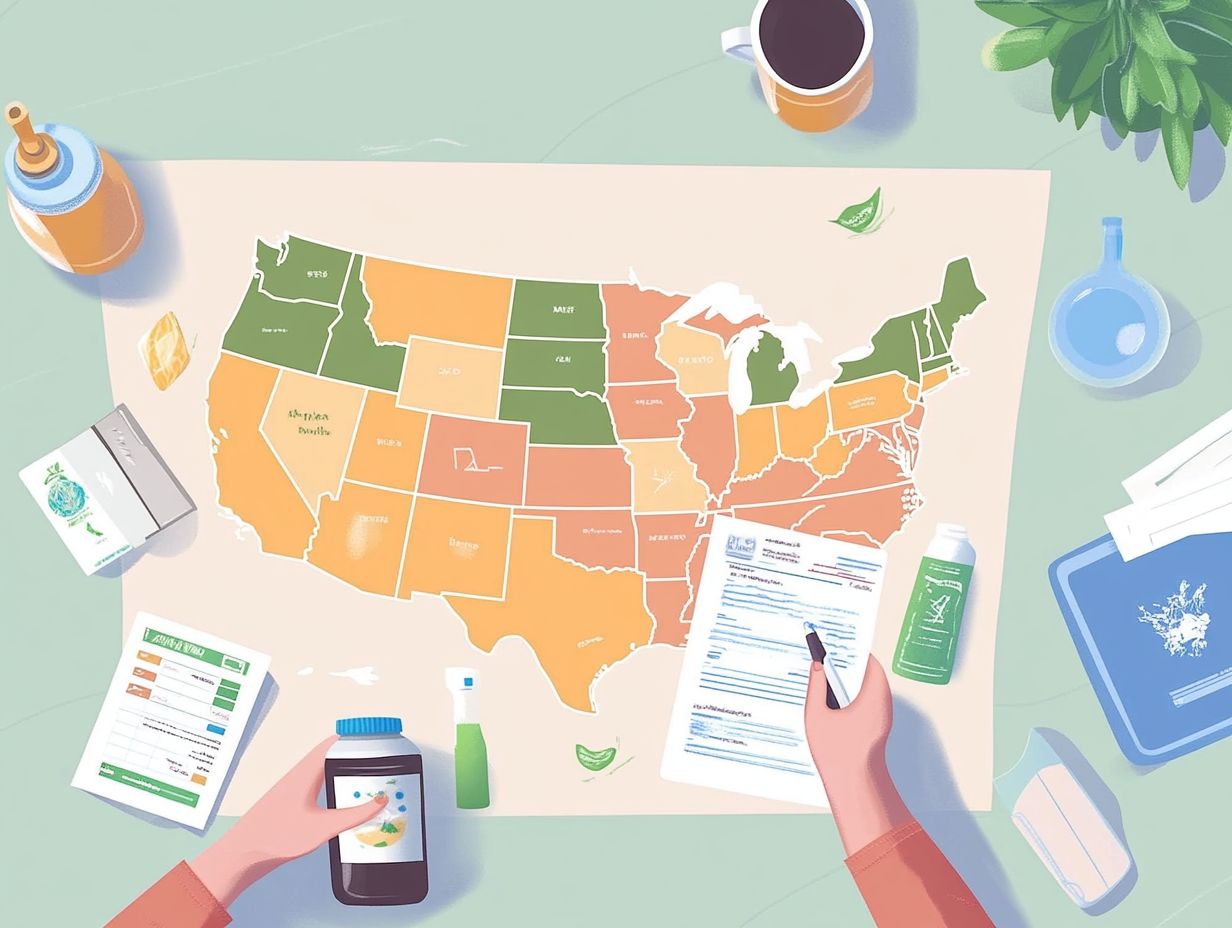
Legal risks associated with home brewing often stem from not adhering to state laws and alcohol regulations, which include production limits, distribution rules, and specific restrictions on homebrewing in certain areas. As a home brewer, you must remain vigilant to steer clear of legal repercussions that could arise from inadvertent violations of your state’s regulations.
To successfully understand the local laws, it s essential for you to thoroughly research your local ordinances and grasp the specific limits placed on home production. Many states outline guidelines regarding the amount of beer you can brew annually for personal use, often capping it around 100 gallons per adult in the household. Additionally, some jurisdictions impose restrictions on sharing or giving away your homebrewed beverages, which can lead to unintended violations if not meticulously followed.
To ensure compliance, consider consulting with local authorities or seeking guidance from brewing associations. This proactive approach can significantly mitigate potential legal issues, allowing you to enjoy a rewarding brewing experience without the nagging worry of running afoul of the law.
How Can I Ensure Safe and Legal Home Brewing?
To ensure that your home brewing is both safe and legal, it’s essential to adhere to best practices. This includes maintaining a clean brewing environment and familiarizing yourself with the homebrew regulations specific to your state. Being aware of your legal residence restrictions and the overall legal framework surrounding homebrewing is also crucial.
Moreover, seeking education and support through local homebrew clubs or online resources can significantly enhance your brewing skills while ensuring you comply with all necessary laws. The American Homebrewers Association is a valuable resource for both educational materials and community support.
What Equipment Do I Need for Home Brewing?
The essential equipment for your home brewing journey includes fermentation vessels, brewing kettles, and various tools designed to monitor the brewing process. Each of these elements plays a significant role in ensuring the success of your beer production. Understanding the necessary home brewing equipment and how it enhances your craft is crucial for engaging effectively in your homebrew activities. Investing in quality tools is essential for anyone serious about brewing.
Beyond the brewing kettle, which acts as the heart of your operation where all the ingredients come together in a delightful blend a reliable thermometer and hydrometer are essential tools. They ensure that temperature and specific gravity, which measures the sugar content in your brew, are measured with precision, leading to optimal results.
You ll also need bottling equipment like a capper and suitable bottles to store your finished product. This allows for proper carbonation while preserving the beer’s freshness.
Each piece of equipment not only streamlines your brewing process but also helps maintain hygiene and quality, ultimately elevating the excellence of your crafted brew.
What Are the Best Practices for Home Brewing?
Best practices for home brewing encompass maintaining impeccable cleanliness throughout your brewing process, adhering closely to time-tested recipes, and continually expanding your knowledge through brewing literature to hone your craft. These practices not only elevate the quality of your beer but also significantly enhance your chances of success in homebrew competitions.
Effective brewing also requires you to prioritize regular equipment sanitation, a crucial step in preventing unwanted contamination and spoilage. By strictly following well-established recipes, you can steer clear of common pitfalls and ensure a balanced, flavorful brew that delights the palate.
Engaging with local homebrew communities, attending workshops, and participating in homebrew competitions can create a vibrant culture of learning and sharing insights, ultimately boosting your brewing skills. By combining a disciplined approach to cleanliness with a willingness to explore new methods and ingredients, you can transform your brewing experience, crafting unique creations that will wow your friends and impress judges!
Additionally, regular involvement in the homebrew community fosters lasting relationships and valuable feedback.
Are There Any Resources for Home Brewing Education and Support?
Numerous resources await your exploration for home brewing education and support. The American Homebrewers Association offers a wealth of literature, workshops, and community interaction opportunities designed specifically for aspiring brewers like you. Publications such as CraftBeer.com and Zymurgy magazine further enrich your knowledge and experience.
Engaging in online forums and joining local brew clubs can also prove invaluable. These platforms allow you to exchange knowledge and experiences within the brewing craft. Online communities like Reddit’s r/Homebrewing and websites such as Brew Your Own magazine provide extensive advice and support.
Books authored by renowned experts, such as John J. Palmer and Randy Mosher, deliver in-depth insights into brewing techniques and recipes. They are essential reads whether you are just starting out or are an experienced enthusiast.
Websites like the American Homebrewers Association and Brew Your Own magazine feature comprehensive articles and guides tailored to various skill levels. This ensures that you find the information you need.
Social media groups and platforms, including Reddit’s r/Homebrewing, allow you to connect with brewers from around the globe. This facilitates discussions on everything from ingredient selection to fermentation troubleshooting.
By tapping into these diverse resources, you can elevate your brewing skills and cultivate a vibrant network of fellow brewing aficionados!
Watch this video to learn more about home brewing!
Frequently Asked Questions
Is Home Brewing Legal in My State?
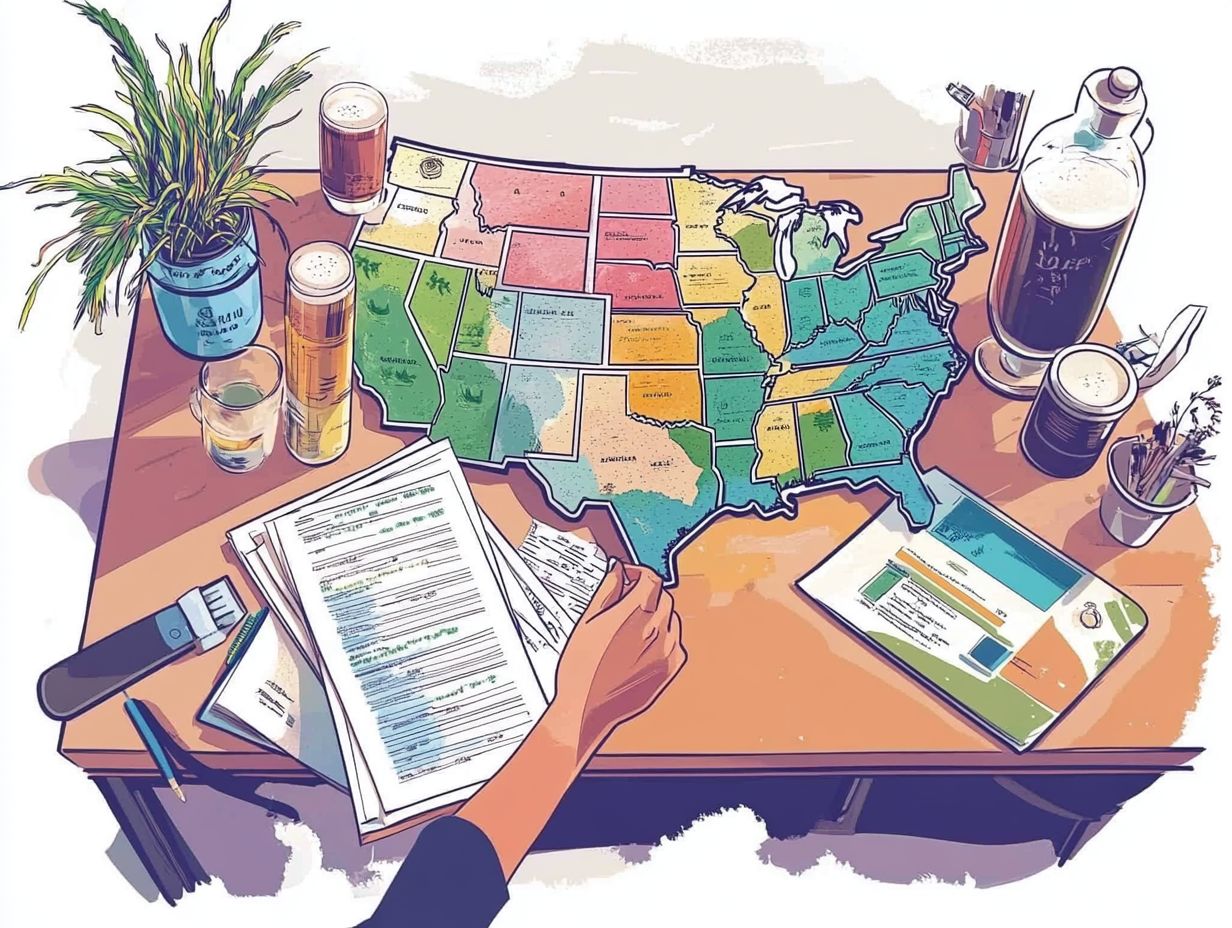
Home brewing is legal in all 50 states under federal law. However, each state has different regulations that must be followed. It’s important to research the laws in your specific state before starting home brewing. Resources like the American Homebrewers Association can provide up-to-date information on homebrew laws and alcohol regulations in your area.
What are the Basic Federal Regulations for Home Brewing?
According to federal law, home brewers are allowed to produce up to 100 gallons of beer per person, or 200 gallons per household, per year for personal consumption. Some states may have their own limits or additional regulations regarding production and personal use.
Are There Any States That Prohibit Home Brewing?
No, all 50 states allow home brewing. However, some may have stricter regulations or require permits or licenses. It is crucial to research the laws in your state to ensure you are following all necessary regulations. The legal history of home brewing dates back to the Prohibition era and the eventual repeal with the 21st Amendment.
Do I Need a License or Permit to Brew Beer at Home?
In most states, a license or permit is not required for home brewing. However, some states may require a permit for selling or distributing homemade beer. Make sure to check with your state’s alcohol control board for specific regulations. Notable states like Alabama and Mississippi have unique stipulations regarding the sale and distribution of alcoholic beverages.
Are There Any Restrictions on Selling My Home Brewed Beer?
Yes, selling home brewed beer is prohibited under federal law. While some states may allow you to sell your beer at certain events or venues, it’s important to check with your state’s laws and regulations. The Alcoholic Beverage Control Board in your state will provide details on alcohol taxation and other relevant rules.
Can I Legally Give My Home Brewed Beer as a Gift?
Yes, under federal law, home brewed beer can be given as a gift to friends and family as long as it is not sold or distributed. However, some states may have restrictions on gifting homemade alcohol, so it’s important to research your state’s laws. Always be mindful of rules governing the consumption and transportation of homebrew.
